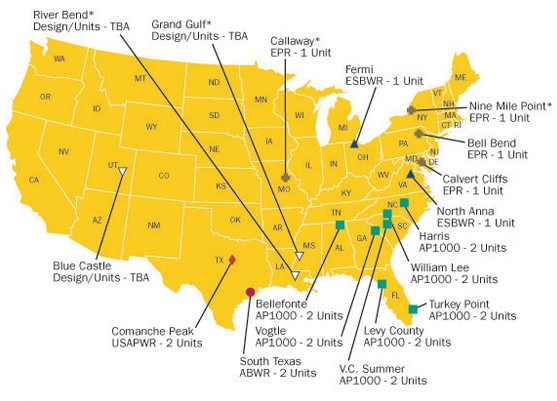Time for a nuclear bailout in America?

A private waste management company (dump operator for those not into politically laundered engineering terms) has refused to accept soil that is radioactive. So now Boeing and NASA will have to look elsewhere for a solution to their pollution. The landfill is the largest in the western U.S. and is NOT licensed to handle radioactive material.
The waste itself comes from clean-up of a partial nuclear meltdown that happened near Los Angeles fifty years ago.
Further north the feds are working to discover what interesting things lie buried at a nuclear disposal site near Hanford, WA. Exploration right now is by ground-penetrating radar and by lowering radiation sensors into newly drilled shafts. Records for what was dumped underground at this specific site were destroyed in the 1990s.
Hanford was where plutonium was made for many of America's nuclear weapons. Shutting down and cleaning up the Hanford site has been a huge undertaking. Over fifty buildings there have been taken down. A huge factory to treat nuclear waste is about half done. All the remedial work at Hanford is being funded by federal stimulus money approved a year ago.
These nuc waste problems underline the political and environmental burden carried by the nuclear industry that is still hoping for a revival in the U.S. However, I recently blogged about all the money going from the federal government to the American nuclear industry this year. And the Nuclear Regulatory Commission (NRC) website sounds positively positive about new nucs actually being built in the U.S. for the first time in decades. Here's a map of where those plants would be built, if approved and funded: 
Nuclear power can seem seductive if you are concerned over greenhouse gases and global warming. Over a year ago greentech conferences were discussing nucs as a response to global warming. At least one American firm, Hyperion, is touting home nuclear plants for home power. Here's the Hyperion website. Hyperion is VC-backed and does not yet have a unit ready for delivery. How great will it be to see billions go into America's nuclear power industry? [poll id="211"]
France is the most nuclear-powered nation on earth, getting much of its electricity from nuclear plants. Here's a description of how they handle their nuclear waste. For over a decade France has been researching a deep underground disposal site for long-lived waste.